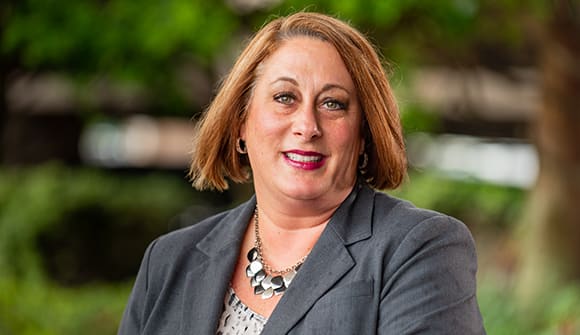Her racing heart was more than just jitters
Woman diagnosed with “Afib” didn’t want to take meds the rest of her life.
Article Author: Vikki Mioduszewski
Article Date:

After a weekend celebrating her husband’s 40th birthday, Kelly Lands, dizzy and sweaty, thought the stress of party planning must have caught up to her. An hour later, she decided the symptoms weren’t going away — and maybe, just maybe, she was experiencing something more than post-celebration jitters.
“I thought I was having a heart attack,” said Lands, director of operations at a local hotel. “My heart was racing at more than 200 beats per minute. I was at home, lying in bed, and I thought if I just relaxed it would go away, but it never did.”
The symptoms turned out to be atrial fibrillation (Afib), an irregular and often rapid heart rate that can increase risk of stroke and other heart-related complications.
“Being diagnosed with atrial fibrillation [Afib for short] isn’t unusual, but for Kelly, it definitely isn’t normal,” said Aaditya Vora, MD, cardiac electrophysiologist with Baptist Heart Specialists. “Her age places her on the lower end of the spectrum for women with atrial fibrillation. Women experiencing symptoms like Kelly’s are often told there is nothing wrong when they are actually having Afib.”
When Lands arrived at the emergency room, Baptist Health team members immediately used an EKG machine to see what was wrong. Noting her racing heartbeat, she received medicine to slow its pace and then stayed overnight to ensure she was OK. Nothing happened. No irregular heartbeat. No racing pulse. No sweaty palms.
The next morning, she left thinking maybe it had been a one-time concern. Two weeks later, Lands returned to Baptist Medical Center Jacksonville with similar symptoms. The doctors determined it was Afib. “Looking back on my first episode, I hadn’t had any alcohol or caffeine,” Lands said. “In my situation, I knew those couldn’t be a trigger. There had to be something really wrong.”
After her diagnosis, Lands elected to have surgery to try to correct the symptoms. According to Dr. Vora, atrial fibrillation ablation involves entering the veins in the leg and navigating to the heart. There, he uses either radiofrequency energy or a freeze balloon (cryoballoon) to create a disruption in the faulty electrical impulses causing the arrhythmia (a heart rhythm disturbance).
In a normal heart, the heart's pacemaker sets the tone — but in patients with atrial fibrillation, the pacemaker is no longer working properly and instead the heartbeat is chaotic and irregular. The minimally invasive procedure aims to correct the symptoms and is especially useful for patients who respond poorly to medication. Treatment usually improves the arrhythmia and associated issues, such as fatigue and shortness of breath.
Determined to avoid lifetime of meds
Diagnosed at 46, Lands didn’t want to spend the rest of her life taking medication in an attempt to manage those symptoms. Surgery made sense to her, even though using ablation to treat Afib isn’t always a 100-percent fix.
“Because Kelly is younger and the medication failed to work, we talked about different options, including this procedure,” Dr. Vora said. “It’s twice as effective as medication, and it doesn’t have all the side effects. We just have to work with her long-term and manage her risk factors to make sure the atrial fibrillation doesn’t come back.”
For Lands, the procedure was a simple overnight experience. Now, by managing her blood pressure, she’s able to nearly eliminate the potential that it returns.
Atrial fibrillation can often be caused by risk factors such as heart disease, valve disease, thyroid issues, obesity and age. It can increase the risk of stroke, but correcting Afib doesn’t prevent stroke, Dr. Vora said. Knowing the symptoms, like fatigue, can help individuals realize they are experiencing Afib — and not just an anxiety attack.
“I haven’t had an episode since,” Lands said. “Even if I did have another one, I would probably do the surgery again. It’s worth it for me just to limit the chance that it happens again. For it to happen at any given time, you just can’t be prepared for that."
To learn more about atrial fibrillation and arrthymia, visit baptistjax.com/heart.



